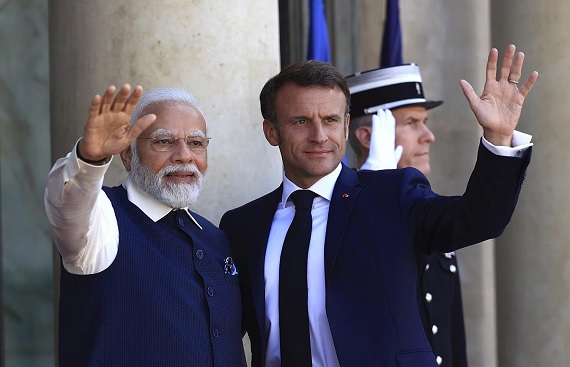Modi-Macron Summit Elevates India-France Ties in Defense, Digital, Energy, Space
By
siliconindia | Saturday, 20 January 2024, 02:40 Hrs

Several months after French President Jacques Chirac's visit to New Delhi and his presence at the Republic Day ceremony in India on January 26, 1998, Prime Minister Atal Behari Vajpayee's administration conducted the Pokhran II nuclear tests. Despite France joining other Western nations in expressing disapproval of the tests, it opted not to endorse the United States-led initiative at the United Nations Security Council to impose sanctions on India. Chirac chose to sustain and foster the strategic partnership between India and France, which had been initiated during his visit to New Delhi and continued by Vajpayee's predecessor, I K Gujral.
A little more than a quarter century later, Emmanuel Macron, the current occupant of the Élysée Palace in Paris, is coming to join President Droupadi Murmu and Prime Minister Narendra Modi on the occasion of the Republic Day of India. Paris unhesitatingly came to the aid of India after President Joe Biden turned down the invitation to be the chief guest at the ceremony as the ties between his administration and New Delhi came under stress in the wake of the US allegation about India’s role in hatching a plot to kill a Khalistani Sikh extremist in New York.
France has consistently maintained its diplomatic relations with India without letting value judgments impact their ties. In contrast to other Western nations, France did not express disapproval of India's decision not to condemn Russia for its military actions in Ukraine. Paris not only acknowledged and respected New Delhi's strategic autonomy but also abstained from interfering in India's internal affairs.
Modi is expected to extend a welcome to Macron upon his arrival in Jaipur, a day ahead of their attendance at the Republic Day parade. The parade will feature a French military contingent marching on the Kartavya Path in New Delhi alongside Indian armed forces personnel. As part of the spectacle, some of the 36 Rafale fighter jets procured by India from Dassault Aviation of France under the 2016 intergovernmental agreement are anticipated to fly past. The agenda for discussions between the two leaders is likely to encompass significant defense deals.
A roadmap for defence-industrial cooperation between India and France is likely to be adopted after the meeting between the two leaders, who are expected to discuss cooperation in the Indo-Pacific region. The two sides may make progress on the proposed deal between Mazagon Dock Shipbuilders Limited of India and the Naval Group of France for the construction of three additional submarines – as a follow-up to the construction of six Kalvari-class – an export derivative of the Scorpène-class of France – diesel-electric submarines for the Indian Navy under New Delhi’s acquisition programme ‘Project 75’. Also on the agenda is the proposed agreement to procure 26 Rafale-M fighter jets from Dassault Aviation of France for the Indian Navy.
While substantial advancement is not anticipated regarding the Electricite de France (EDF) nuclear power plant proposal in Jaitapur, Maharashtra, the two parties may initiate a collaboration for jointly developing Small Modular Reactors and Advanced Modular Reactor technologies. The discussions between Modi and Macron are also likely to encompass bilateral space cooperation, encompassing the joint exploration efforts for Mars and Venus between ISRO and CNES, maritime monitoring, and France's backing for India's Gaganyaan program.
